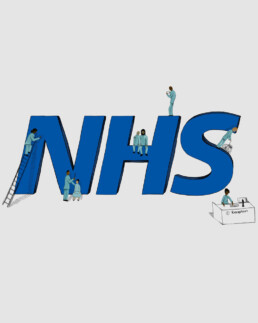
Illustration: Lucy Waterworth
The Doctor (anon)
Two Doctors
Some details in this story have been changed to protect anonymity.
I walked along the corridor to the relative’s room to talk about a ‘not for resuscitation’ order. I was armed with the golden nugget of information passed on by my nurse that the son was ‘medical’ and had expressed a wish for his father to remain for resuscitation.
I was going to tell the son that his 87-year-old father had been deemed by the medical team as not suitable to be considered for resuscitation.
I had earlier spoken about resuscitation with the patient – a frail man with a very kind face. He was himself a doctor. He’d listened and quietly agreed it was for the best. He wanted me to convey this decision to his son.
I went to the small family room on the ward. It had plain white walls and a plainer brown sofa. I had spoken to many families in this room, supporting them through difficult conversations. I’d barely entered the room when the son said abruptly that he wants his father to be resuscitated. He felt unable to agree with the ‘not for resuscitation’ decision. He pointed out that his dad had been active and was a very accomplished man.
I’d had similar conversations many times, putting across the most pragmatic and persuasive arguments to help family members understand decisions of this nature. I was used to supporting people through the difficult discussions around the best interests of a patient. But this time was different.
This time I’d just returned from Greece after burying my 87-year-old dad. My dad had been a distinguished doctor and had earned accolades equivalent to the OBE before being struck down by a heart attack. He had been physically and mentally sharp as ever just before. I’d sat down with his medical team. They proceeded to tell me that resuscitation was not in his best interests.
I had given them all the medical arguments I had and all the reasons why he should be resuscitated. I had refused to even acknowledge the current frailty and state of health of my dad. I’d sat in a big open room with multiple medical team members present. I remember thinking that we’d probably been labelled as a ‘difficult family’. They presented me with biochemical evidence of how unwell my father was.
My closest cousin had pointed out to me that ‘even the most active person deserves a compassionate death.’ I had unwillingly subjugated and with pain laid down all my medical arguments and accepted the decision of the ‘not for resuscitation’ decision. 48 hours later I had mourned my father’s death.
The son sitting across from me now proceeded to give me all the reasons why I should keep his dad to be for resuscitated just as I had with my own father. I outlined all the medical reasons he should not be. I remember the son telling me I spoke very well, but he still wanted his father to be for resuscitation.
I saw mirrored in this son myself, two people fighting for their dads, knowing in their medical heart all the reasons why it would not be in his best interests. Both of us refusing to acknowledge it and fighting hard.
Suddenly I desperately wanted to help this man, more than I ever had before. I wanted to support him to go through and reach as quickly as possible the other end of the painful tunnel I had recently crossed. And so I began the talk.
For the first time (but not the last), I shared my personal story. After a few moments he sat back on the brown sofa. His manner changed and a weight seemed to shift.
He paused and asked me what had I done, what decision I had taken. I told him. The conversation afterwards was short. He accepted the decision calmly and was very composed – but I could still see doubts in his eyes. I held his hand in both of mine in an unmoving handshake. Two strangers, two doctors, two sons. And then we parted.
I hope very much that I had in some small way helped him on his journey ahead.